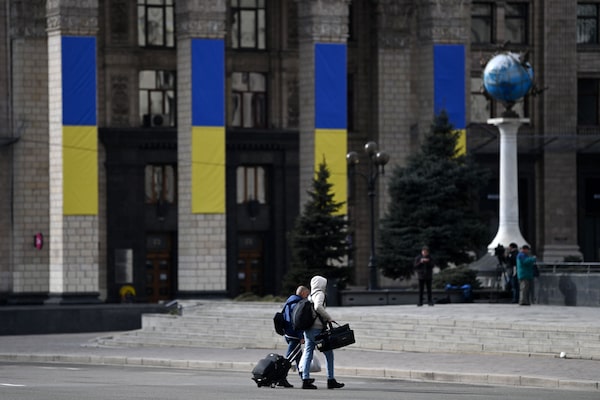
Men with bags and a suitcase walk in central Kyiv on Feb. 25.DANIEL LEAL/AFP/Getty Images
Vladimir Putin has justified Russia’s devastating invasion of Ukraine as a defence of “Russia’s strategic bottom line,” but Ukraine’s vast stores of natural resources, from gas and ore to critical rare earth minerals and agricultural commodities, suggest an economic calculus could also be driving Russia’s aggression.
A tally of Ukraine’s resource ledger shows what Russia stands to gain were it to seize and retain control of the entire country, an outcome that is not widely expected but which cannot be ruled out given Mr. Putin’s erratic path to war.
Ukraine’s natural-gas reserves are the second largest in Europe, after only Norway, with 1.09 trillion cubic metres of total proved reserves. Even so, it consumes nearly one-third more gas than it produces, making it a net importer. Years of corruption and political chaos have stunted the development of Ukraine’s energy sector, leaving its reserves largely untapped.
The country boasts the sixth-largest iron-ore reserves in the world, according to the latest report from the U.S. Geological Survey. It has the world’s 10th-largest reserves of titanium and the second largest in Europe. The metal in particular is a critical component in aircraft manufacturing, and Russia was a major supplier of titanium to engine makers such as Rolls-Royce, which halted their purchases of Russian titanium this week.
The eastern Donbas region of Ukraine, where Russia has backed separatist insurgencies, is also rich in lithium, a key ingredient for manufacturers of electric-vehicle batteries. The area abounds with other energy resources, providing Ukraine with the second-largest coal reserves in Europe and the largest store of uranium on the continent.
Known today as “Europe’s breadbasket” for its rich soils and vast fields of wheat, corn and other grains, Ukraine’s resources have long underpinned the Russian economy, from Czarist times through the Soviet era.
“Ukraine’s iron metal reserves and agricultural reserves have been available to feed the Russian industrial complex and that’s part of the bigger picture behind Putin’s actions,” said Jeff Sahadeo, a professor at Carleton University’s Institute of European, Russian and Eurasian Studies.
“Putin wants to make sure he has this economic powerhouse and that’s one of the reasons Donbas is particularly important.”
With Russian tanks rolling across Ukraine, debate has arisen over Mr. Putin’s motivation for launching the assault. Some experts have tended to focus on the Russian President’s empire-building ambitions, dismissing the idea that the country sees Ukraine as a lucrative resource asset.
“I do not believe that control of natural resources is a substantial part of Russia’s strategic interest in Ukraine,” says Yuliia Ivaniuk, co-ordinator of the University of Manitoba’s Centre for Ukrainian Canadian Studies.
“For Putin, Ukraine first and foremost is a geopolitical project of re-establishing the Russian empire and preventing Ukraine from becoming a liberal democracy.”
How did Russia’s invasion of Ukraine unfold? A timeline in maps
Others, however, see a link between Mr. Putin’s expansionist goals and Ukraine’s resource wealth.
In a report last month, Seth Jones, a director at the Center for Strategic and International Studies in Washington, pointed to the danger of a potential resource grab by Mr. Putin. “Russian annexation of some or all of Ukraine would increase Russian manpower, industrial capacity and natural resources to a level that could make it a global threat,” he wrote then.
Javad Keypour, a lecturer in energy security and international relations at Tallinn University in Estonia, has studied Russia’s 2014 illegal annexation of Ukraine’s Crimean Peninsula. He said the era of countries launching conflicts based on acquiring energy and oil resources is over.
“This isn’t like when Saddam Hussein attacked Kuwait to get its oil,” he said.
Nevertheless, Mr. Keypour draws a straight line between Russia’s invasion and Ukraine’s massive energy reserves. That’s because Western Europe is so heavily dependent on Russian natural gas to power its homes and economy, and Ukraine’s gas reserves pose a potential threat to Russia’s stranglehold on that market.
The European Union is the world’s largest importer of natural gas, and depends on Russia for more than 40 per cent of its gas. That dependence was only set to increase once gas started flowing through the newly constructed Nord Stream 2 pipeline, which linked Russia with northeastern Germany and bypassed existing pipelines that run through Ukraine.
After Russia ordered its armed forces into Ukraine, Germany halted the certification process for the pipeline.
“There isn’t motivation for Russia to capture Ukraine’s energy resources itself because Russia already has some of the largest oil and gas reserves, but the European Union is still dependent on Russian gas resources and Ukraine could play a significant role in exporting independent gas to the EU,” Mr. Keypour said.
“For a Russia that wants to maintain its dominance of the European Union’s natural-gas market, it’s not tolerable to see that Ukraine could benefit the EU.”
In other words, seizing control and destabilizing Ukraine’s resources is more about kneecapping a future rival than taking control of Ukraine’s gas fields for itself.
Mr. Keypour points to events in Crimea, where Russia’s takeover saw it also lay claim to the maritime zone around the peninsula and the underwater resources. Russia has found little success developing the offshore gas field, but it has succeeded in blocking Ukraine from pursuing its own strategy of energy independence. Ukraine’s minister of ecology and natural resources has said the country lost nearly US$11-billion in natural resource and related assets as a result of Russia’s annexation of Crimea
With Western countries lining up to impose ever-harsher penalties and sanctions on Mr. Putin and Russia, it begs the question whether the attack on Ukraine is worth the cost, whether that’s measured in strategic gains or the outright value of Ukraine’s natural resources.
“Putin needs to convince the Russian people that the sanctions are worth enduring in the national interest, but it’s not enough to appeal to people’s emotions by talking about wanting Ukrainian steel or ore or grains, so Putin frames it in terms of fighting Nazis or defending the people in the Donbas,” said Prof. Sahadeo.
“But behind the curtain, the resource calculation is always there.”
Your time is valuable. Have the Top Business Headlines newsletter conveniently delivered to your inbox in the morning or evening. Sign up today.
 Jason Kirby
Jason Kirby